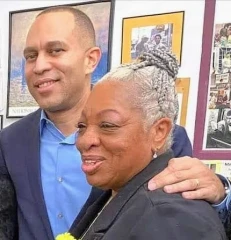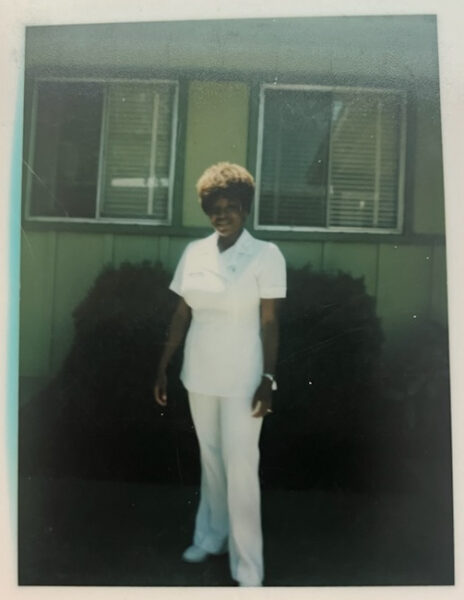This article was written by Jeff Jardine and was originally published by CalVet Connect.

Kelley, with House Minority Leader Hakeem Jeffries
At a recent veterans event in Los Angeles, a woman approached Patricia Jackson Kelley and offered words of appreciation.
“I don’t know if you are aware of the difference you made in my life,” the woman told her, referring to a moment that occurred roughly two decades ago, when Kelley worked as a program coordinator at the VA Greater Los Angeles Healthcare System’s West Los Angeles VA Medical Center.
“You told me, ‘You are worthy. You are somebody. I care about you,’” the woman said. “It made such a difference in my life. I will always remember that.”
As will Kelley remember the woman’s gratitude.
February is Black History Month, March is Women’s History Month, and count Kelley among the history makers who bridge the two.
In a career spanning more than six decades, she has touched a great many women’s lives in a variety of ways—as a nurse, a veteran, the first women veterans program manager at the West Los Angeles VA Medical Center, a mentor, a trailblazer, and continuing to this day—an advocate through her work with the American Legion.
If those weren’t enough, Kelley also soars in the rarified air of being a Black woman who served in three separate branches of the military over her 26-year career: in the U.S. Navy Reserve, as an active duty Air Force officer before joining the Air Force Reserve, and finally a member of the Army Reserve. She retired as a lieutenant colonel in 2003.
In the early 1960s, Kelley began working alongside her mother and aunt at Bellevue Hospital in New York. She became a licensed vocational nurse in 1964, then a registered nurse four years later. A college program associated with the hospital enabled her to earn her bachelor’s of science degree in nursing. Living on Staten Island, she passed by a Navy recruiting office on her way to work each day.

A nurse, a veteran, the first women veterans program manager at the West Los Angeles VA Medical Center, a mentor, a trailblazer!
“I stopped in one day, and we talked about the possibility of joining the Navy,” Kelley said. “I went into the Navy Reserve in 1977 as a Hospital Corpsman Second Class with the goal of becoming an officer.”
When she sought active duty in the Navy, she was told there were no positions for women in the unit. When her reserve enlistment ended, Kelley applied for the Army Reserve only to be told, after waiting for months to hear back from them, that they had no record of her enlistment paperwork.
“So, I went to the Air Force Reserve and the recruiter said, ‘Why Reserve? Go active duty,’” Kelley said.
She signed on at age 36 in 1979, her college degree enabling her to enter as a captain. Her military career included a 15-month duty at a small hospital in the Azores, but also gave her what she really coveted.
“I always wanted to come to California,” Kelley said.
She did, and to Southern California. When her active duty ended, she transferred to the Air Force Reserve while awaiting a job at the West Los Angeles VA Medical Center. That wait caused by the slowness of the military to provide references to the VA—left her out of work for more than five months. She avoided homelessness for herself and young son by the grace of friends who took them in as house guests.
The paperwork finally arrived and Kelley became a staff member in the VA’s psychiatric family unit, spending two years there before leaving to head a home care agency in Los Angeles. She later returned to the VA as the head nurse of the 40-bed substance abuse unit. She also left the Air Force Reserve and signed on with the Army Reserve to continue her military career.
Kelly went on to become the West Los Angeles VA Medical Center’s first women veterans program manager and then served as the women veterans coordinator from 1993 until her retirement in 2003. During her time at the VA, she was instrumental in opening a proper women’s health clinic.
“Women coming in for their mammograms were literally changing in the hallway behind a cover over the doorway,” Kelley said. “Before I left we had a state-of-the-art mammogram unit.”
She advocated so hard for women veterans, she said, that she was told she was spoiling them. Management moved her into the patient advocate office, where she helped women and other veterans get the care they needed.
Kelley continues to build her resume and legacy in so-called “retirement.” She’s the immediate past national president of the National Association of Black Military Women. She’s an advisory commissioner for the Los Angeles County Military & Veterans Affairs second district.
She has served as a member of the VA’s Sexual Assault and Harassment Prevention work group, and is commander of the American Legion Jackie Robinson Post 252 in Los Angeles.
In March 2022, she gave the keynote address during the “Fighting for the Right to Fight” speaker series in Orange County, where she lectured on the U.S. Army’s 6888th Central Postal Directory Battalion, which became the only all-African American, all-female unit sent overseas during World War II.
Yet, for all that she’s accomplished in life—overcoming obstacles, the promotions and the “firsts”—little moments like the compliment she received from the woman veteran last month mean the most.
“It just touched me when she said that,” Kelley said.
Indeed, history—including Black History and Women’s Military History—so often is made through those moments of humanity that impact others.













Inspired! Congratulations on all your accomplishments and the service you have continued to honor fellow veterans with.
Fine way οf describing, and fastidious article to obtain data on the topic of my preѕentation toρic, which i am going to present in academy.